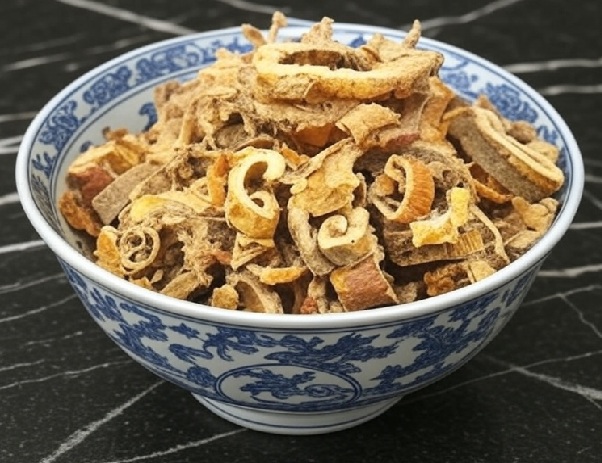Mulberry Bark Chinese Herb

Mulberry Bark (Sang Bai Pi): A Lung-Clearing Herb for Cough, Wheezing, and Water Retention
Introduction
Mulberry bark, known as Sang Bai Pi (桑白皮) in Traditional Chinese Medicine (TCM), is a cooling herb used primarily to clear Lung heat, stop cough, and promote urination. With its sweet and cold nature, it is especially effective for treating phlegmy or heat-induced respiratory conditions such as bronchitis, asthma, or dry cough. It also supports water metabolism by helping reduce edema associated with Lung and Kidney disharmony.
What Is Mulberry Bark?
Sang Bai Pi is the inner bark of the mulberry tree (Morus alba), a tree also valued for its fruit, leaves, and branches in TCM. In herbal classification, it is sweet and cold, and it enters the Lung meridian. Traditionally, it is used to clear heat from the Lungs, transform phlegm, stop coughing, and reduce swelling. Its dual effect on the respiratory and urinary systems makes it a useful herb for clearing excess heat and fluids.
Health Benefits of Mulberry Bark
Clears Lung Heat and Stops Cough
Used for dry or productive coughs, wheezing, and asthma due to Lung heat or phlegm-heat.
Promotes Urination and Reduces Edema
Helps relieve swelling and water retention, especially in the face and upper body.
Transforms Phlegm and Eases Breathing
Assists in clearing thick, yellow phlegm and opens up the chest and lungs.
Cools the Lungs Without Drying
Its moistening quality helps prevent excessive dryness while clearing heat.
Supports Children and Elderly Respiratory Health
Gentle enough for use in age-specific formulas to soothe persistent cough or wheezing.
How to Use Mulberry Bark
In Decoctions for Cough or Swelling
Use 6–12 grams with herbs like Huang Qin, Xing Ren, or Ting Li Zi. Simmer for 20–30 minutes.
In Lung-Heat or Asthma Formulas
Commonly found in formulas such as Ma Xing Shi Gan Tang or Xie Bai San for heat-type respiratory issues.
In Powder or Granule Form
Available in extract form for easy mixing into teas or taken in capsule form for cough relief.
Where to Buy Mulberry Bark
You can find Sang Bai Pi at the following places:
- Chinese herbal medicine stores
- Respiratory health or TCM-focused apothecaries
- Online retailers such as Amazon, iHerb, or TCM-specific websites
Look for:
- Thin, fibrous inner bark strips that are pale yellow or white
- Clean, sulfur-free, and pesticide-free sources
- Properly dried and free of mold or moisture damage
Are There Any Side Effects?
Mulberry bark is generally safe and well-tolerated. It should be used cautiously in individuals with chronic cold, weak Lung qi, or loose stools. Its cooling nature may aggravate cold-type coughs or deficiency conditions if not properly balanced with warming herbs.
Conclusion
Mulberry bark, or Sang Bai Pi, is a cooling and moistening herb in TCM that effectively clears Lung heat, relieves cough and wheezing, and reduces fluid retention. Its dual action on the respiratory and urinary systems makes it a valuable choice for managing inflammation, phlegm, and swelling—especially in warm or phlegmy conditions.
FAQs
Can I take mulberry bark every day?
It can be used daily during acute flare-ups of cough or edema but should be monitored for long-term use.
What does mulberry bark taste like?
It has a mildly sweet, slightly bland flavor with a cooling sensation.
Is mulberry bark safe for children?
Yes, in pediatric doses and typically included in children’s formulas for cough or asthma under practitioner guidance.

